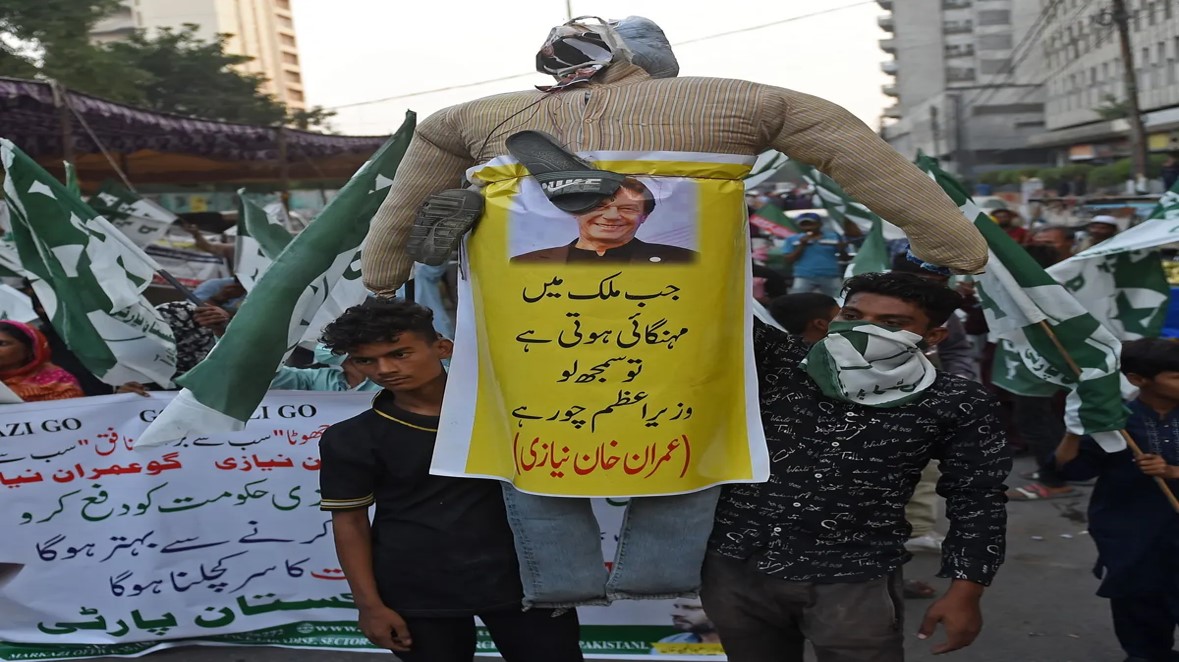On Friday night, 27-year-old Asadullah, who sold old shoes on a cart, set himself on fire in the Pakistani city of Karachi.Ghani, a relative, blamed the state of an economy where rampant inflation is hitting those least able to cope. In comments to local media, he said Asadullah used to get calls from his wife and parents asking him for money, but he could not afford to pay the rent and meet his own expenses and sending money back home was no longer possible.
“We can’t run our homes, that’s why Asadullah committed suicide,” Ghani said. “I know five more people who are fed up with inflation and want to end their lives because of skyrocketing prices. The government should have mercy and decrease the inflation.”
An economic meltdown is putting the Pakistani prime minister, Imran Khan, under immense pressure and bringing the threat of unrest as record inflation – the fourth highest in the world – pushes the price of sugar higher than petrol.
Before coming to power, Khan had vowed to root out corruption and lift people out of poverty as he promised a new and prosperous Pakistan with the creation of 10m jobs. Instead, after a visit to Saudi Arabia last month, he announced $3bn in financial support from Riyadh.
In an address to the nation last week, Khan blamed the opposition for past mistakes and inflation in the international market for the miseries of the people in Pakistan. He also announced a 120bn-rupee relief package providing subsidies on essential food items.
Khurram Hussain, an economic analyst, said it was not enough. “The package is a drop in the ocean and will do little to help the mass of ordinary people. The pressure on Imran Khan will continue to mount because we have seen further price hikes, such as of fuel and sugar, after the announcement of the package.”
He said inflation was imposing a crushing burden on ordinary people because it comes at a time of high unemployment and stagnant wages. Prices of some essential items, such as fuel and electricity, are unprecedentedly high.
The Pakistan Democratic Movement (PDM), an opposition alliance, has announced a campaign against the government of Pakistan Tehreek-e-Insaf (PTI) and the inflation rates the country is witnessing. A long march against inflation was also announced as a part of the campaign from Lahore to Islamabad.
It says ordinary people of the country will struggle to afford basic necessities if prices do not come down.
Two weeks ago, Mohammed Ghufran, 47, a shopkeeper in Mardan, Pakistan’s north-western province, was arrested after he went to a mosque and prayed for cursing the prime minister. Ghufran said he had seen a fall in the number of customers as prices went up. He talked about inflation to daily wage workers, who told him that they could not afford to buy food for their families.
“I rushed to a mosque and announced to the speakers that we should curse Imran Khan,” he told the Guardian. “The prime minister promised a new (Naya) Pakistan and that it would be a welfare state for ordinary people but he has done the opposite. He is crushing the poor.”
Ghufran said he regretted voting for Khan and “everyone I know who voted for him and believed in him” regretted it, too. “People in my neighbourhood supported my calls against Imran Khan after I was released in two days. We believe Imran khan should resign if he can’t control the prices of essential commodities.”
Three years ago, a sack of sugar (50kg) cost about 3,000 rupees (£13) but now it is more than 7,000 rupees (£30). “As he lied to us, I pray God would ask him,” he said.
A government employee, asking to remain anonymous, told the Guardian that the prices of necessary commodities had increased with little increase in income.
The government has failed to control inflation,” he said. “I could run my kitchen for 60,000 rupees (£261) three years ago and now I can’t do it for 90,000 rupees (£393).”

